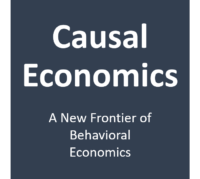Why Universal Basic Income is Universally Wrong—New Insights from Causal Economics
In the unprecedented environment of the COVID-19 pandemic the income and livelihood of many organizations has been decimated. As a result, there’s been a massive surge in support programs administered through the government. Within all of the chaos, the concept of Universal Basic Income has gained some traction on both the left and right sides of the political spectrum. This very brief article will apply the perspective of Causal Economics, a stream of Behavioral Economics, to demonstrate that from a theoretical perspective Universal Basic Income is not an effective economic policy.
What is the Lens of Causal Economics?
Causal economics is a stream of behavioral economics that centers on the principle of causal coupling. Causal coupling models decisions as requiring upfront cost and effort in anticipation of future anticipated benefits—like the real world. This is very different from other mainstream decision models that unrealistically either assume complete rationality or allow for irrationality but characterize decisions as single period random outcomes. Causal coupling also implies that societal policies will be fair and sustainable to the extent that they couple cost and benefit across all stakeholders. It means that people are free and accountable. Essentially, citizens reap the rewards of their contribution, contribute effort in order to benefit and pool significant risks to protect each other from catastrophic outcomes.
Why is Universal Basic Income Economically So Bad?
Universal Basic Income is:
- Fundamentally inconsistent with the principles of a free and fair society
- A contributor to dependence on government
- Inefficient and ineffective in achieving noted objectives
Inconsistent with Principles of a Free and Fair Society
Universal Basic Income is inconsistent with the core principles of free and fair society. Free society requires democracy and free enterprise to allow the personal expression of freedom. Citizens decide how they want to contribute (the costs they will bear, such as employment effort) in pursuit of a better life for their families (the benefits they desire). This upfront cost borne in anticipation of future benefit is the very definition of causal coupling.
Universal Basic Income taxes citizens that contribute to economic output and redistributes it. Some goes to those in genuine hardship, but a great deal goes to citizens that are quite capable of contributing work effort in order to generate such additional funds. It’s critical not to confuse Universal Basic Income with a true social safety net which directly helps those in need in the short and long-term. Workfare in particular allows able people facing tough times to contribute just as proudly as everyone else while they seek ways to get ahead, reducing marginalization.
Even a basic understanding of causal economics makes clear that the thinking behind Universal Basic Income is not in line with free enterprise democracy. The concept that some working citizens are forced to send funds to others that could also work for such funds isn’t consistent with freedom and certainly isn’t a social safety net. Universal Basic Income decouples cost and benefit across most stakeholders.
Government Dependence
Politically, Universal Basic Income is called Income. However, it is not in any economic sense income. No production of output and earning of income have occurred. It is a forced redistribution of funds. It sets a dangerous precedent to rename what is not even an effective social safety net as income. If recipients see this as income received with no need to contribute, the most fundamental principle of free enterprise is abandoned—the commitment to contribute effort/services in exchange for income.
When the incentive structure is consistently decoupled in this manner, a money-for-nothing entitlement can set in and create an endowment effect that results in a dependence on government. People can feel entitled to their transfers from other tax payers—one some recipients don’t earn through any effort or contribution. Government dependence may seem beneficial to recipients, but in the long-term it isn’t fair to them as it undermines the mindset of freedom to contribute and reap larger rewards.
Inefficient & Ineffective
Some fiscal conservatives support Universal Basic Income because they see it is a simple, administratively efficient and transparent way to provide a social safety net and put a cap on ever-encroaching taxes for government programs. Although administratively simpler, Universal Basic Income is very inefficient and ineffective because it doesn’t target and help only the people that actually need assistance. The money that goes to those that should be able to contribute for their income is no longer available to those in actual need. There are multiple breakdowns here in causal coupling. Recipients that are capable of working for this additional income but now don’t have to are able to benefit without bearing any cost. Taxpayers bear costs with no benefit from knowing they fund a program that actually helps people, and other taxes and programs will not be removed to make way for Universal Basic Income. Those in real need still face prohibitive costs and reduced benefits given that some funds are distributed to those not in genuine need of a social safety net.
Key Insights
Social safety nets are important tools to assist those in need. Universal Basic Income masquerades as a social safety net but doesn’t go only to those that need help. Universal Basic Income also fundamentally undermines the principles of a free and fair society, potentially marginalizing many for the longer-term into an entitled reliance on government that can even span generations. Causal economics and the principle of causal coupling show us that it’s best to maintain free enterprise for society and provide strong workfare or valuefare programs to support those that genuinely need help in the short and/or long-term. For those without the ability to contribute temporarily or ongoing there must also be traditional welfare support in place.
